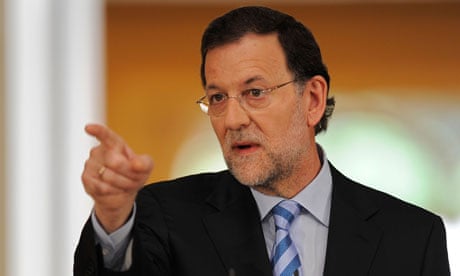Spain's prime minister, Mariano Rajoy, on Sunday made a desperate attempt to portray a €100bn (£81bn) bailout of his country's banking system as a triumph at the start of a week which could determine the future of the single currency.
Speaking hours before flying to Poland to watch Spain's World Cup-winning soccer team play its first match of Euro 2012, Rajoy proclaimed that the "credibility of the euro won" following Saturday's bank bailout, funded by eurozone countries.
But with Greeks returning to the polls on Sunday, the crisis engulfing the eurozone is far from over amid speculation that the absence of tough conditions attached to the loans being readied for Spain could give ammunition to attempts by Greece, Ireland or Portugal to renegotiate the terms of their bailouts.
Rajoy, speaking for the first time since the bailout was agreed, is embarking on a concerted campaign to present the deal as a national victory, with Spain receiving a cheap loan after European partners asked for little in return beyond regular interest payments.
The Spanish newspaper El Mundo described the financial rescue of its banks by its European partners as a "bailout without humiliation", reflecting Spain's determination to avoid a direct intervention in its economy of the kind suffered by Greece, Ireland and Portugal.
Financial analyst Gary Jenkins, of research house Swordfish, said it was "difficult to see how a 'bailout lite' will go down well in Ireland, Greece or Portugal". He added: "We come to the week that may well dictate the future of the eurozone. On a worst-case scenario, the outcome of the Greek elections that take place on Sunday 17 June could create even further uncertainty and stress in the system.
"However, it could be argued that whoever manages to form a government will feel that they have a little more moral high ground to renegotiate the terms of the bailout than was previously the case due to the Spanish bailout."
Rajoy, who denied two weeks ago that Spain's banks needed a rescue package, insisted he had not faced pressure from his eurozone partners. "I was the one who was pressing, because what I wanted was a credit line to resolve a very important problem," he said. "Other people did this three years ago and I have said before that it should have been done three years ago," he said, passing the blame back to the previous government of the socialist José Luis Rodríguez Zapatero.
"Yesterday the credibility of the euro won, the future of the euro won, the European Union won and the chances that Spain can soon recover a level of lending that will improve investment and job creation also won."
Rajoy claimed that, rather than highlighting the weakness of a country unable to rescue its own banks, the bailout was proof of the success of his reform programme and of the fierce austerity measures his conservative government has imposed since taking power in December.
"If we hadn't achieved all we have done over the past five months, then yesterday what would have been discussed was an intervention of the Spanish state," he said.
Sony Kapoor, managing director of the economic thinktank Re-Define, said that while it was possible to see the potential €100bn as a "bailout lite" it should be remembered that what Spain "has been trying to do already is not much less onerous than has been asked of others".
Rajoy warned that Spain – already in a double-dip recession with unemployment at 24% – had worse to come. "This year is going to be a bad one," he said. "Growth is going to be negative by 1.7%, and also unemployment is going to increase."
The European commission has suggested that Spain be allowed to relax its deficit targets, but Spanish officials insisted that they would continue to try to slash the deficit from 8.9% last year to 3% in 2013. Officials said that, while the bailout money will see Spain's national debt shoot up, interest payments would not be added to its deficit as these would be paid by the banks.
It was unclear, however, when or how much money would be requested, and there was confusion about the conditions attached.
"There are no macroeconomic conditions for our country," Rajoy said. "The conditions are on those who receive the loans, and those are the banks."
But eurozone finance ministers said on Saturday they would monitor Spain's deficit and reform programme carefully.
Artur Mas, prime minister of Catalonia's regional government, welcomed the move.
"It constitutes support from our European partners which we truly appreciate, but it is not assistance 'à fonds perdus'... it will have to be repaid with the corresponding interest."
Rajoy, an ardent sports fan, was unapologetic about flying to Poland to watch Spain draw 1-1 with Italy in the Euro 2012 tournament and lamented that he could not be in Paris at the same time to watch Rafael Nadal win the Roland Garros tennis tournament.
"I'll be there two and a half hours and then I'll leave," he said of the football trip. "I think the national team deserves it."










